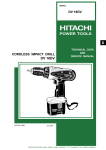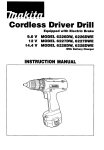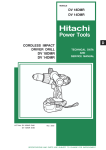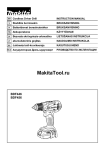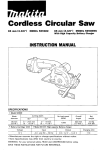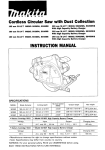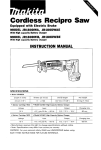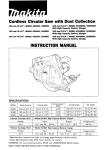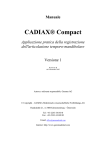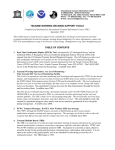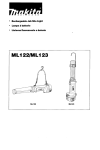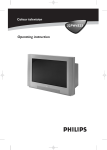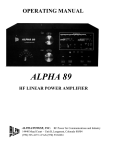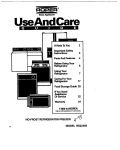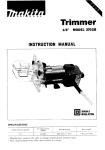Download Makita 8413 Drill User Manual
Transcript
Cordless Percussion=DriverDrill Equipped with Electric Brake INSTRUCTION MANUAL DZ DWA Nt-Cd 2 0 AH DWD N I - M H ~ ~ H DWF NI-MH 3 o AH- - - SPECIFICATIONS Concrete Steel Wood Wood screw Machine screw 13 mm f 1/2 ") 13 m m ( 1 /2 ") 30 m m (1-3/16"1 6 mm x 75 m m (1/4" x 3") 6 mm (1/4" ) 8413D 38" No load speed (RPM) Model 8413D 8433D 84431) I I I 1 High 0-1'300 /min. o~,.,!,;~ o ~ I I I " lOmmx90mm (3/8" x 3-1/2") 0-400 /min. 'it, ; 1 I I High 0-19,500 0 - 19.500 0-21,000 ~ I I I 1 Overall length Low 0-6,000 0 -6,000 0-6,750 1 1 1 ;zlxy -,/2,,) 267mm fiylxm) 7 2 V - 144V * Manufacturer reserves the right t o change specifications without notice Note Specifications may differ from country to country WARNING For your personal safety, READ and understand before using SAVE THESE INSTRUCTIONS FOR FUTURE REFERENCE 2 I 1/4 " ) Blows per minute Low o/~Tnpnso I 6 mm 11/4 ) Net weight I I 1 2.3kg15.1 Ibs) 2 4 kg 15 3 Ibs) 2.6 kg15.7 lbsl GENERAL SAFETY RULES U’A(l(’J1 (For All Battery Operated Tools) WARNING! Read and understand all instructions. Failure to follow all instructions listed below, may result in electric shock, fire and/or serious personal injury. SAVE THESE INSTRUCTIONS Work A r e a 1. Keep your work area clean and well lit. Cluttered benches and dark areas invite accidents. 2. D o not operate power tools in explosive atmospheres, such as in the presence of flammable liquids, gases, or dust. Power tools create sparks which may ignite the dust or fumes. 3.Keep bystanders, children, and visitors away while operating a power tool. Distractions can cause you t o lose control. Electrical Safety 4. A battery operated t o o l with integral batteries or a separate battery pack must be recharged only with the specified charger for the battery. A charger that may be suitable for one type of battery may create a risk of fire w h e n used with another battery. 5. Use battery operated t o o l only with specifically designated battery pack. Use of any other batteries may create a risk of fire. Personal S a f e t y 6. Stay alert, watch what you are doing, and use common sense when operating a power tool. D o n o t use tool while tired or under the influence o f drugs, alcohol, or medication. A moment of inattention while operating power tools may result in serious personal injury. 7. Dress properly. D o not wear loose clothing or jewelry. Contain long hair. Keep your hair, clothing, and gloves away from moving parts. Loose clothes, jewelry. or long hair can be caught in moving parts. 8. Avoid accidental starting. Be sure s w i t c h is in the locked or off position before inserting battery pack. Carrying tools w i t h your finger o n t h e switch or inserting the battery pack into a tool with the switch o n invites accidents. 9.Remove adjusting keys or wrenches before turning the tool on. A wrench or a key that is left attached t o a rotating part of the tool may result in personal injury. 10. Do not overreach. Keep proper footing and balance at all times. Proper footing and balance enable better control of t h e tool in unexpected situations. 1 1 , Use safety equipment. Always wear eye protection. Dust mask, non-skid safety shoes, hard hat, or hearing protection must be used for appropriate conditions. 3 Tool U s e a n d C a r e 12. Use clamps or other practical way t o secure and support the workpiece t o a stable platform. Holding the work by hand or against your body is unstable and may lead t o loss of control. 13.Do not force tool. Use the correct tool for your application. The correct tool will do t h e job better and safer at the rate for which it is designed. 14. Do n o t use t o o l i f s w i t c h does n o t t u r n it o n or off. A tool that cannot be controlled with the s w i t c h is dangerous and must be repaired. 15. Disconnect battery pack from tool or place the s w i t c h in the locked or o f f position before making any adjustments, changing accessories, or storing the tool. Such preventive safety measures reduce the risk of starting the tool acc id e nta IIy. 16. Store idle tools out of reach of children and other untrained persons. Tools are dangerous in the hands of untrained users. 17. When battery pack is n o t in use, keep it away f r o m other metal objects like: paper clips, coins, keys, nails, screws, or other small metal objects that can make a connection f r o m one terminal t o another. Shorting the battery terminals together may cause sparks, burns, or a fire. 18. Maintain tools with care. Keep cutting tools sharp and clean. Properly maintained tools with sharp cutting edge are less likely t o bind and are easier t o control. 19. Check for misalignment or binding of moving parts, breakage of parts, and any other condition t h a t may affect the tool's operation. If damaged, have the t o o l serviced before using. Many accidents are caused b y poorly maintained tools. 20. Use only accessories t h a t are recommended by the manufacturer for your model. Accessories that may be suitable for one tool may create a risk of injury when used o n another tool. Service 21. Tool service m u s t be performed only by qualified repair personnel. Service or maintenance performed by unqualified personnel may result in a risk of injury. 22. When servicing a tool, use only identical replacement ,parts. Follow instructions in the Maintenance section of this manual. Use of unauthorized parts or failure t o follow Maintenance Instructions may create a risk of shock or injury. 4 Specific Safety Rules 1. Hold tool by insulated gripping surfaces w h e n performing an operation where the cutting tool may contact hidden wiring. Contact w i t h a "live" wire will also make exposed metal parts of the tool "live" and shock the operator. 2. Be aware that this tool is always in an operating condition, because it does n o t have t o be plugged i n t o an electrical outlet. 3. Always be sure you have a f i r m footing. Be sure no one is below w h e n using the tool in high locations. 4. Hold the tool firmly. 5. Keep hands away from rotating parts. 6. Do not leave the tool running. Operate the tool only w h e n hand-held. 7. Do not touch the drill bit or the workpiece immediately after operation; they may be extremely hot and could burn your skin. SYMBOLS The followings show the symbols used for tool. v n, .................................... volts .................................... direct current .................................... no load speed .../min ................................... b .................................... revolutions or reciprocation per minute number of blow 5 IMPORTANT SAFETY INSTRUCTIONS FOR CHARGER & BATTERY CARTRIDGE I. SAVE THESE INSTRUCTIONS - This manual Length of Cord (Feet) AWG Size of Cord 6 25 18 50 100 150 18 18 16 ADDITIONAL SAFETY RULES FOR CHARGER & BATTERY CARTRIDGE USCUOl 1 1 . Do not charge Battery Cartridge w h e n temperature is BELOW 10°C (5OOF) or ABOVE 4OoC (104OF). 2. Do not attempt t o use a step-up transformer, an engine generator or DC power receptacle. 3. Do not allow anything t o cover or clog t h e charger vents. 4. Always cover the battery terminals with t h e battery cover w h e n the battery cartridge is not used. 5. A battery short can cause a large current flow, overheating, possible burns and even a breakdown. (1) Do n o t touch the terminals with any conductive material. ( 2 )Avoid storing battery cartridge in a container with other metal objects such as nails, coins, etc. ( 3 )Do not expose battery cartridge t o water or rain. 6. Do not store the tool and Battery Cartridge in locations where t h e temperature may reach or exceed 5OoC (122OF). 7 . Do n o t incinerate t h e Battery Cartridge even i f it i s severely damaged or i s completely worn out. The battery cartridge can explode in a fire. SAVE THESE INSTRUCTIONS. 7 FUNCTIONAL DESCRIPTION Installing or removing battery cartridge Always switch off the tool before insertion or removal of the battery cartridge To remove the battery cartridge, withdraw it from the tool while pressing the buttons on both sides of the cartridge *To insert the battery cartridge, align the tongue on the battery cartridge with the groove in the housing and slip it into place Always insert it all the way until it locks in place with a little click If not, it may accidentally fall out of the tool, causing injury to you or someone around you * D o not use force when inserting the battery cartridge. If the cartridge does not slide in easily, it is not being inserted correctly Charging *Your new battery cartridge is not charged You will need to charge it before use Use the high capacity battery charger Model DC1411 (for 8413D and 8433D) / DC1801 (for 8443D) to charge the battery cartridge Battery cartridge Charging light Plug the high capacity battery charger into the proper A C voltage source The charging light will flash in green color *Insert the battery cartridge so that the plus and minus terminals on the battery cartridge are on the same sides as their respective markings on the high capacity battery charger. Insert the cartridge fully into the port so that it rests on the charger port floor. When the battery cartridge is inserted, the charging light color will change from green to red and charging will begin. The charging light will remain lit steadily during charging. When the charging light color changes from red to green, the charging cycle is complete and the charger will switch into its "trickle charge (maintenance charge)" mode. The charging time is approximately one hour. *After charging, unplug the charger from the power source CAUTION: *The high capacity battery charger Model DC1411 / DC1801 is for charging Makita battery cartridge. Never use it for other purposes or for other manufacturer's batteries. When you charge a new battery cartridge or a battery cartridge which has not been used for a long period of time, it may not accept a full charge This is a normal condition and does not indicate a problem. You can recharge the battery cartridge fully after discharging it completely and recharging a couple of times. 8 If you charge a battery cartridge from a just-operated tool or a battery cartridge which has been left in a location exposed to direct sunlight or heat for a long time, the charging light may flash in red color If this occurs, wait for a while Charging will begin after the battery cartridge cools The battery cartridge will cool faster if you remove the battery cartridge from the high capacity battery charger If the charging light flashes alternately in green and red color, a problem exists and charging is not possible The terminals on the charger or battery cartridge are clogged with dust or the battery cartridge IS worn out or damaged Trickle charge (Maintenance charge) If you leave the battery cartridge in the charger to prevent spontaneous discharging after full charge, the charger will switch into its "trickle charge (maintenance charge)" mode and keep the battery cartridge fresh and fully charged. Tips for maintaining maximum battery life 1. Charge the battery cartridge before completely discharged. Always stop tool operation and charge the battery cartridge when you notice less tool power. 2. Never recharge a fully charged battery cartridge. Overcharging shortens the battery service life. 3. Charge the battery cartridge with room temperature at 10°C - 40°C (50°F - 104°F). Let a hot battery cartridge cool down before charging it. Switch action CAUTION Before inserting the battery cartridge into the tool, always check to see that the switch trigger actuates properly and returns to the "OFF" position when released To start the tool, simply pull the trigger Tool speed is increased by increasing pressure on the trigger Release the trigger to stop 9 Reversing switch action CAUTION *Always check the direction of rotation before operation *Use the reversing switch only after the tool comes to a complete stop Changing the direction of rotation before the tool stops may damage the tool *When not operating the tool, always set the reversing switch lever to the neutral position This tool has a reversing switch to change the direction of rotation Depress the reversing switch lever from the A side for clockwise rotation or from the B side for counterclockwise rotation When the switch lever is in the neutral position, the switch trigger cannot be pulled Reversing switch lever Clockwise Speed change To change the speed, first switch off the tool and then slide the speed change lever to the "11" side for high speed or " I " side for low speed Be sure that the speed change lever is set to the correct position before operation Use the right speed for your job - 1 Counterclockwise I 1 t t Low speed High speed - Speed change lever CAUTION: *Always set the speed change lever fully to the correct position. If you operate the tool with the speed change lever positioned half-way between the " I " side and "11" side, the tool may be damaged. *Do not use the speed change lever while the tool is running. The tool may be damaged. 10 Selecting the action mode This tool employs an action mode changing ring Select one of the three modes suitable for your work needs by using this ring For rotation only, turn the ring so that the arrow on the tool body points toward the anamark on the ring For rotation with hammering, turn the ring so that the arrow points toward the +on the ring For rotation with clutch, turn the ring so that the arrow points toward the m3 mark on the ring '' Action mode changing ring Arrow I CAUTION: Always set the ring correctly to your desired mode mark. If you operate the tool with the ring positioned half-way between the mode marks, the tool may be damaged. Adjusting the fastening torque The fastening torque can be adjusted in 16 steps by turning the adjusting ring so that its graduations are aligned with the arrow on the tool body. The fastening torque is minimum when the number 1 is aligned with the arrow, and maximum when the number 16 is aligned with the arrow. Before actual operation, drive a trial screw into your material or a piece of duplicate material to determine which torque level is required for a particular application. A 11 ASSEMBLY Installing or removing driver bit or drill bit CAUTI0N : Always be sure that the tool is switched off and the battery cartridge is removed before installing or removing the bit. Turn the sleeve counterclockwise to open the chuck jaws. Place the bit in the chuck as far as it will go. Turn the sleeve clockwise to tighten the chuck. To remove the bit, turn the sleeve counterclockwise. - When not using the driver bit, keep it in the bit holders. Bits 45 mm (1-3/4") long can be kept there. Bit Bit holder I Side grip (auxiliary handle) Always use the side grip to ensure operating safety. Install the side grip so that the teeth on the grip fit in between the protrusions on the tool barrel. Then tighten the grip by turning clockwise at the desired position. It may be swung 360" so as to be secured at any position. Teeth Side grip Loosen 12 Tighten Adjustable depth rod The adjustable depth rod is used to drill holes of uniform depth Loosen the thumb screw, set to desired position, then tighten the thumb screw s OPERATION Screwdriving operation First, turn the action mode changing ring so that the arrow on the tool body points to the c . 4 marking Adjust the adjusting ring to the proper torque level for your work Then proceed as follows Place the point of the driver bit in the screw head and apply pressure to the tool Start the tool slowly and then increase the speed gradually Release the trigger as soon as the clutch cuts in *When driving wood screws, predrill pilot holes to make driving easier and to prevent splitting of the workpiece. See the chart. Nominal diameter of ' woodscrewl"l Recommended size of pllot hole 1)" 3 1 11/8"1 2 0 - 2 2 15/64'' - 3/32") 3 5 19/64',) 2 3 - 2 5 13/32" 3 8 15/32") 2 5 - 2 8 13/32''- 7/64',) ~ 3/32',) 4 5 (1 1/64"J 2 9 - 3 2 (7164" - 1/8"J 4 8 (3/16") 3 1 - 3 4 (1/8" - 9/64") 5 1 113/64") 3 3 - 3 6 1,IlE'' - 9/61") 5 5 17/32") 3 7 - 3 9 (914'' 5/32") 5 8 17/32") 4 0-4 6 1 I 15/64 "1 4 2 - 4 4 11 1/64" - 11/64") ~ 2 15/32'' - 11/64") *If the tool is operated continuously until the battery cartridge has discharged, allow the tool to rest for 15 minutes before proceeding with a fresh battery. 13 Drilling operation First turn the action mode changing ring so that the arrow on the tool body points to the marking The adlusting ring can be aligned in any torque levels for this operation Then proceed as follows 2 *Drilling in wood When drilling in wood best results are obtained with wood drills equipped with a guide screw The guide screw makes drilling easier by pulling the bit into the workpiece *Drilling in metal To prevent the bit from slipping when starting a hole, make an indentation with a centerpunch and hammer at the point to be drilled Place the point of the bit in the indentation and start drilling Use a cutting lubricant when drilling metals The exceptions are iron and brass which should be drilled dry CAUTION *Pressing excessively on the tool will not speed up the drilling In fact, this excessive pressure will only serve to damage the tip of your bit, decrease the tool performance and shorten the service life of the tool *There is a tremendous force exerted on the tool/bit at the time of hole breakthrough Hold the tool firmly and exert care when the bit begins to break through the workpiece *A stuck bit can be removed simply by setting the reversing switch to reverse rotation in order to back out However, the tool may back out abruptly if you do not hold it firmly *Always secure small workpieces in a vise or similar hold-down device *If the tool is operated continuously until the battery cartridge has discharged, allow the tool to rest for 15 minutes before proceeding with a fresh battery Hammer drilling operation First, turn the action mode changing ring so that the arrow on the tool body points to the +marking. The adjusting ring can be aligned in any torque levels for this operation. Position the bit at the desired location for the hole, then pull the trigger. Do not force the tool. Light pressure gives best results. Keep the tool in position and prevent it from slipping away from the hole. Do not apply more pressure when the hole becomes clogged with chips of particles Instead, run the tool at an idle, then remove the bit partially from the hole. By repeating this several times. the hole will be cleaned out and normal drilling may be resumed. CAUTION: There is a tremendous and sudden twisting force exerted on the tool/bit a t the time of hole breakthrough, when the hole becomes clogged with chips and particles, or when striking reinforcing rods embedded in the concrete. A.ways use the side grip (auxiliary handle) and firmly hold the tool by both side grip and switch handle during operations. Failure to do so may result in the loss of control of the tool and potentially severe injury. 14 Blow-out bulb Use the blow-out bulb to clean out the hole I Installing set plate For 8413D Always install the set plate when using battery cartridges 1200, 1202 or 1202A. Install the set plate on the tool with the screw provided. 15 MAINTENANCE CAUTION Always be sure that the tool is switched off and the battery cartridge is removed before attempting to perform inspection or maintenance Replacing carbon brushes Remove and check the carbon brushes reqularlv. Replace when they wear down to the limit mark. Keep the carbon brushes clean and free to slip in the holders. Both carbon brushes should be replaced at the same time. Use only identical carbon brushes. I / / Limit mark Use a screwdriver to remove the brush holder caps. Take out the worn carbon brushes, insert the new ones and secure the brush holder caps. To maintain product SAFETY and RELIABILITY, repairs, maintenance or adjustment should be performed by Makita Authorized or Factory Service Centers, always using Makita replacement parts Recycling the Battery The only way to dispose of a Makita battery is to recycle it. The law prohibits any other method of disposal. @ Ni-Cd To recycle the battery: 1. Remove the battery from the tool. 2. a). Take the battery to your nearest Makita Factory Service Center or b). Take the battery to your nearest Makita Authorized Service Center or Distributor that has been designated as a Makita battery recycling location. Call your nearest Makita Service Center or Distributor to determine the location that provides Makita battery recycling. See your local Yellow Pages under ’ ‘Tools-Electric’ 16 ACCESSORIES CAUTION These accessories or attachments are recommended for use w i t h your Makita tool specified in this manual The u s e of any other accessories or attachments might present a risk of injury t o persons The accessories or attachments should b e used only in t h e proper and intended manner Bits * 1 Sire I Part No Heavy duty masonry drill bit for Dercussion drill 1 Phillips Part No 711120-1 71 1121-A Slotted ,> L Square drill bit 7846064A Phillips bit Part NO I Size I L imm) Bit diameter I 3/16" 114'' I 1 Overall lenqth Shank dia 3116" 114" 1 114" 4 4 71 1 122-A 711123-A 71 1124-A 114" 5/16" 318" 1/4" 6 6 6 711125-A 112" 318" 6 711126-A 711127-A 5/8" 3/4" 318" 3/8" 6 6 711128-A 71 1129-A 114" 3/8" 114" 114" 13 13 711130-A 112" 318" 13 1/4" Double-ended Phillips / Slotted bit 1-3/4" long Part No 7846144 2-1/2" long Part No 784613-A 1 * Blow-out bulb Part Part No Drill dla Shank dia Flute length Overall length 711011-A 711012-A 711013-A 711014-A 711015-A 711016-A 711017-A 711018-A 711019-A 71 1020-A 711021-A 1/16" 3/32" 118" 5/32" 3/16" 7/32" 114'' 9/32" 5/16" 11/32" 112" 1/16" 3/32" 7/8" 1-1/4" 1-518'' 2" 2-5/16" 2-1/2" 2-3/4" 2-5/16" 3-3/16" 3-7/16" 3-5/8" 1-7/8" 2-1/4" 2-314" 3-1/8" 3-1/2" 3-314" 4" 4-1/4" 4-1/2" 4-3/4" 5" 711000A-A 1/8" 5/32" 3/16" 7/32" 1/4" 9/32" 5/16" 11/32'' 318'' I , No 765009-6 Rubber pad assembly Part No 123001-2 Foam polishing pad Part No 743023-2 6 pc set 1/16", 118". 3/16", 1/4". 5/16", 3/8" Best selling bits in convenient case 17 Wool bonnet Part No. 743401-6 - ‘Grip assembly Part No 122575-0 Battery cover Depth rod Part No. 414938-7 Part No. 122576-8 High capacity battery charger Model DC1801 High capacity battery charger Model DC1411 Battery cartridge 1222 I 1234 I 1235 Battery cartridge 1422 I 1434 I 1435 m Battery cartridge 1822 I 1834 I 1935 Safety goggles Part No. 191686-2 A>’Plastic carrying case 18 * Set plate MAKITA LIMITEDONE YEAR WARRANTY Warranty Policy Every Makita tool is thoroughly inspected and tested before leaving the factory. It is warranted to be free of defects from workmanship and materials for the period of ONE YEAR from the date of original purchase. Should any trouble develop during this one-year period, return the COMPLETE tool, freight prepaid, to one of Matita’s Factory or Authorized Service Centers. If inspection shows the trouble is caused by defective workmanship or material, Makita will repair (or at our option, replace) without charge. This Warranty does not apply where: repairs have been made or attempted by others: repairs are required because of normal wear and tear: The tool has been abused, misused or improperly maintained; alterations have been made to the tool. IN NO I-VENT SHALL MAKITA BE LIABLE FOK A N Y INDIRECT, INCIDI NTAL OR CONSEQUENTIAL DAMAGES FROM THE SALF OR USk Ob THE PRODUCT THIS DISCLAIMER APPLIES BOTH DURING AND AFTER THk TERM OF TlllS WARRANTY MAKITA DISCLAIMS LIABILITY FOR ANY IMPLIED WARRANTIES, INCLUDING IMPLIED WARRANTIES OF “MERCHANTABILITY” AND “FITNESS FOR A SPECIFIC PURPOSE,” AFTER THE ONE-YEAR TERM O F THIS WARRANTY. This Warranty gives you specific legal rights, and you may also have other rights which vary from state to state. Some states do not allow the exclusion or limitation of incidental or consequential damages, so the above limitation or exclusion may not apply to you. Some states do not allow limitation on how long an implied warranty lasts, so the above Limitation may not apply to you. Makita Corporation of America 2650 Buford Hwy., Buford, GA 30518 884288-983 PRINTED IN USA 2000-1 -N



















